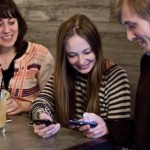 Has the Internet brought out the rudeness in people? According to one Christian Science Monitor opinion writer, the answer is decidedly yes.
Has the Internet brought out the rudeness in people? According to one Christian Science Monitor opinion writer, the answer is decidedly yes.
“We’re rude and crass and unthinking on the Internet for the same reason it’s easier to blow up people when you’re piloting a drone from 6,000 miles away,” writes marketing expert and journalist Adam Hanft, who is also the coauthor of “The Dictionary of the Future.”
Think, says Hanft, of vicious comments to blogs posted by anonymous posters, trigger-happy senders of email missives, or the rise in cyberbullying by young Internet users.
Psychologists blame our poor online behavior on a condition called “moral disengagement.” Put simply – the further we are distanced from our actions, the easier it is to emotionally separate ourselves from those actions, Hanft notes.
Add to this the fact that electronic media opens the door wide to allow minor disturbances to creep into our lives and many of us are primed for a meltdown, says Hanft.
The author makes a call for the rest of us to call out boorish behavior in an effort to introduce social change, much in the way society no longer tolerates pejorative racial and ethnic epithets or inappropriate sexual comments.
“One way for Internet etiquette to become a new kind of normative activity [is] through the ostracism that comes from exhibiting embarrassing bad behavior,” argues Hanft.
He also suggests several technological interventions to help solve the rudeness problem by pointing out rude behavior before it occurs and asking us to reflect on our actions before we follow through.
One idea Hanft has would be to develop a “Write and Save” feature as part of an e-mail platform. Users could opt into the feature, which would hold emails for a set period of time before they were released. Another feature would deliver a pop-up message whenever one used an expletive in an email.
We think the author is onto something important. If you agree, vow to show better Internet etiquette today. Remember — every major societal change begins with the smallest of steps.



